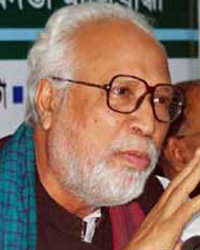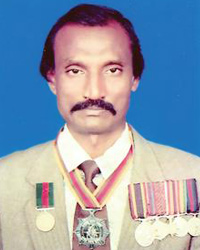
Regional forces
Last updated: 5 October 2017 From the section 1971 Muktijuddho
Besides Mukti Bahini, many other independent forces were organised that fought the Pakistan Army in various regions of Bangladesh and liberated many areas.
These Bahinis include:
- Mujib Bahini
- Kaderia Bahini of Tangail (in Mymensingh-Tangail 11 sector)
- Latif Mirza Bahini of Sirajganj, Rajshahi
- Akbar Hossain Bahini of Jhinaidah, Khulna
- Hemayet Bahini of Faridpur
- Quddus Molla and Gafur Bahini of Barisal
- Afsar Battalion and Aftab Bahini of Mymensingh
- Zia Bahini of Sundarban
- Siraj Sikdar, leader of Sorbohara Party, also organised his force in Barisal
 (Abdul) Kader Siddiqui (Born 1948)
(Abdul) Kader Siddiqui (Born 1948)  Hemayet Uddin (1941) Bir Bikrom. Muktijuddha (Freedom Fighter) leading the Hemayet Bahini (Force) during 1971 Liberation War of Bangladesh. Operated in Faridpur region. Affectionately addressed by the Mukti bahini headquarters as 'Himu'. Before war, a Havildar of the East Bengal Regiment of Pakistan army, and also worked as an instructor at the Pakistan Military Academy in Abbottabad. Conferred a military rank of Subedar after the war.
Hemayet Uddin (1941) Bir Bikrom. Muktijuddha (Freedom Fighter) leading the Hemayet Bahini (Force) during 1971 Liberation War of Bangladesh. Operated in Faridpur region. Affectionately addressed by the Mukti bahini headquarters as 'Himu'. Before war, a Havildar of the East Bengal Regiment of Pakistan army, and also worked as an instructor at the Pakistan Military Academy in Abbottabad. Conferred a military rank of Subedar after the war. Latif Mirza ()
Latif Mirza ()  Akbar Hossain ()
Akbar Hossain ()
Kaderia Bahini
One of the strongest and most effective local guerrilla groups was located in the Tangail area, where a young Bengali revolutionary named Abdul Kader Siddiqui, a dashing, flamboyant and fearless leader (later self-styled "General" and nick named "Bagha" or "Tiger" Kader) formed an effective band of insurgents. The strength of this group eventually grew to 16,000 armed men. It not only dominated the Tangail area, certain areas of Mymensingh District and Dhaka, but also played a crucial role in the Indian Army's plans for the liberation of Dhaka.
Liberation was brought by the common people.
Who was I - a mere student leader at a Mufassil college! I had war thrust upon me. Bangabandhu's 7th March speech inspired the nation, and it's true we were doing cadet-type training and mock drills. But I will not deny that we were in shock on March 26 1971. The tragedy stunned us.
When the [Mujibnagar] leaders left for India, the field was empty. I was a college student - I was not equipped to lead men in a war. You can call me a fool, but I thought that if I left, people would laugh at me. I remembered the fiery speeches I had made, and thought that I could never show my face again in Tangail if I turned tail. On March 26, I realised that it is easy to talk about giving blood in front of a microphone, but it is tough to do it on the battlefield.
'Tiger' Kader Siddiqui determination to fight back
Unlike other resistance movements in history, the Bengali resistance was never so terrorised as to resort to betrayal and treachery.
